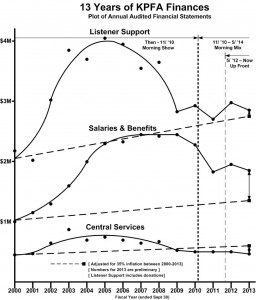WHAT MY OCTOBER
DIRECTOR’S INSPECTION REVEALED
By Janet Kobren,
In mid-October 2015 after numerous inquiries from KPFA members regarding the two large bequests made to KPFA amounting to a total of $958,000, I decided to perform a director’s inspection at KPFA to look into the bequest documents.
Note that the bequests had been reported at the April 2015 KPFA Local Station Board meeting. SaveKPFA’s LSB member Margy Wilkinson was serving as PNB chair and interim Executive Director at the time. KPFA General Manager Quincy McCoy’s April and May 2015 General Manager’s Report reflected these bequests (see “A Partial Financial Landscape of KPFA”.)
As a result of my director’s inspection I learned, among other things, that:
1) The will of the Hall Trust listed $400,000 to be distributed to PACIFICA FOUNDATION RADIO*,
2) The estate’s check was made out for this amount to pay to the order of PACIFICA FOUNDATION RADIO and was deposited in KPFA’s bank account (albeit one of Pacifica Foundation’s DBA’s** is KPFA), and
3) There was no reference to KPFA in the will or on the check.
I also learned that the check for the other bequest was specifically written to KPFA for $558,000 and correctly deposited in KPFA’s bank account.
This discrepancy caused me to explore the Hall Trust further, discovering some gaps in information with regards to how the Hall Trust bequest had been handled internally. The bequest that had been spelled out in the bequest document and the check to go to PACIFICA FOUNDATION RADIO, rather than going to or through a Pacifica Foundation bank account, was deposited directly into KPFA’s bank account.
I meticulously chronicled this matter with substantial source documentation that included references to and actions by individual employees and which also revealed other individuals and organizations named in the bequest documents, all of which would have precluded this matter from being addressed in an open session. I had suspected there was more to be learned regarding this matter, but absent any other documentation provided even after requesting additional information that would have filled in some of the gaps, I was motivated by my fiduciary duties as a Pacifica National Board Director to bring the matter to the PNB as soon as possible. There was some back and forth within the PNB by email but no additional documentation was provided. So I presented the chronology/analysis that I had prepared to the PNB prior to its October 29, 2015 PNB closed session meeting and made the following motion during the meeting:
That by the end of day November 4, 2015 the KPFA GM and the interim Controller:
- Produce an accounting with documentation to the PNB of how the Hall Trust bequest has been allocated and spent to date, including what KPFA transferred to Pacifica units – KPFT, KPFK, PRA, WBAI and election deposit shortages and the remaining balance, if any; and
- If a remaining balance exists, transfer it to the PNO unit or other Pacifica units as appropriate; and
- Based on the accounting, revise the plan to repay KPFA; and
- Based on the accounting, revise the KPFA and PNO budgets accordingly.
This is how the vote went:
Voting YES: Teresa Allen (KPFT), Rodrigo Argueta (KPFK), Lydia Brazon (KPFK), Jim Brown (WPFW), Stephen Brown (WBAI), Adriana Casenave (KPFT), Janet Coleman (WBAI), Benito Diaz (WPFW), Janet Kobren (KPFA), Janis Lane-Ewart (KFAI Affiliate), Lawrence Reyes (KPFK)
Voting NO: Brian Edwards-Tiekert (KPFA), George Reiter (KPFT), Cerene Roberts (WBAI), Pete Tucker (WPFW), Margy Wilkinson (KPFA)
ABSTENSIONS: None
PRESENT NOT VOTING: Robert Mark (KPFT), Tony Norman (WPFW)
The tally came to: 11-YES, 5-NO, 0 ABSTENSIONS, 2-PRESENT NOT VOTING
The motion passed handily and was included in the report-out of the executive session.
The main argument against my motion, chiefly by those directors who have a vested interest in KPFA, included a claim that since the snail mail address of an individual whose name was similar to but not the same as the name spelled out in the Hall Trust documents, someone who had donated a total of $1,745 between 1990 and 2014 (which by the way was way less than 1% of $400K) was in the North Bay and within the KPFA “signal area”, it was the “intent” of the donor to bequeath the $400K to KPFA, and not the Pacifica Foundation, even though the will and the check had spelled out PACIFICA FOUNDATION RADIO on both, with no reference to KPFA.
To me this was an attempt by some within Pacifica to interpret the intent of the donor, and there is no way, short of a seance, to determine the donor’s intent beyond that specified in her will.
Many questions remain, among which are the following: Was SaveKPFA’s influence through the then PNB chair/iED Margy Wilkinson used to make the interest of the Pacifica Foundation network to solely benefit SaveKPFA?
To what extent does a financially weakened Pacifica Foundation, possibly intentionally starved to facilitate its bankruptcy, benefit a private entity, the now not-so-secret KPFA Foundation?
And, how far will Brian Edwards-Tiekert, the SaveKPFA, KPFA LSB member, PNB Director and chair of the PNB National Finance Committee (aka the PNB treasurer) go through motion after motion to attempt to get proposals passed to “capture” KPFA’s license for the benefit of an undemocratic, private entity?
KPFA has transferred approximately $310,000 of the two bequests to various Pacifica units to compensate for network-wide shortages at WBAI, KPFT, KPFK, WPFW, PRA, and PNO (see the KPFA General Manager’s April and May 2015 Report here),
♦♦♦♦
* Between February 26, 2013 and January 20, 2015, the “Pacifica Foundation” name had been captured by an entity in New York during which Pacifica used the name “Pacifica Foundation Radio” until recapturing the “Pacifica Foundation” name back on April 9, 2015.
** DBA = Doing Business As. A DBA is also sometimes referred to as a fictitious business name. In the case of the Pacifica Foundation, it is the Pacifica Foundation, not the fictitious name, that is the entity conducting any business in the name of a DBA.
♦♦♦♦
SEE MORE INFORMATION AND SUPPORTING DOCUMENTATION HERE A Partial Financial Landscape of KPFA
November 3, 2015






